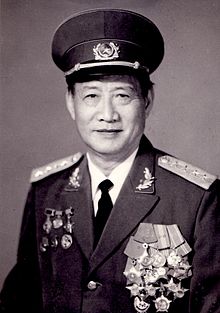Hoang Van Thai
| Hoàng Văn Thái Hoàng Văn Xiêm |
|
|---|---|

Portrait of General Hoàng Văn Thái (1986)
|
|
| 1st Chairman of the Committee of Physical Training and Sports of Vietnam | |
|
In office 1960–1965 |
|
| President | Hồ Chí Minh |
| Prime Minister | Phạm Văn Đồng |
| Preceded by | None |
| Succeeded by | Hà Quang Dự |
| Deputy Minister of Ministry of Defence | |
|
In office 1974–1986 |
|
| President |
Tôn Đức Thắng Trường Chinh |
| Minister |
Võ Nguyên Giáp Văn Tiến Dũng |
| 1st Chief of General Staff | |
|
In office 7 September 1945 – 1953 |
|
| President | Hồ Chí Minh |
| Preceded by | None |
| Succeeded by | Văn Tiến Dũng |
|
In office 1954–1954 |
|
| Preceded by | Văn Tiến Dũng |
| Succeeded by | Văn Tiến Dũng |
|
In office 1975 – 1975 (acting) |
|
| Personal details | |
| Born |
1 May 1915 Tây An, Tiền Hải, Thái Bình Province, French Indochina |
| Died | 2 July 1986 (aged 71) 108 Hospital, Hanoi, Vietnam |
| Spouse(s) | Lương Thị Thanh Bình Đàm Thị Loan |
| Awards |
See full list below for details of orders and commemorative medals awarded |
| Military service | |
| Nickname(s) | Quốc Bình (1941-1944 in China) Mười Khang (1965-1973 as Vietcong commander) Thành |
| Allegiance |
|
| Service/branch |
|
| Years of service | 1941–86 |
| Rank |
|
| Commands |
Việt Minh Vietnam People's Army People's Liberation Armed Forces |
| Battles/wars |
First Indochina War Battle of Điện Biên Phủ Vietnam War Tết Offensive |
| Vietnamese name |
| Vietnamese birth name |
Hoàng Văn Thái (1 May 1915 – 2 July 1986), born Hoàng Văn Xiêm, was a Vietnamese communist military and political figure. His hometown was Tây An, Tiền Hải District, Thái Bình Province. During the Tết Offensive, he was the highest senior North Vietnamese officer in South Vietnam. He was the first chief of staff of the Vietnam People's Army, and the key military force in North Vietnam. He was Chief of Staff in the Battle of Điện Biên Phủ.
Hoang Van Thai was born Hoang Van Xiem, on May 1, 1915, in the village of An Khang (now Tay An, Tien Hai District, Thai Binh Province). His father, Hoang Van Thuat, was a Han Nom teacher.
Hoang Van Xiem was dedicated to studying. Graduated in a French-Vietnamese colonial elementary school, however, he dropped out of school at the age of 13 because of financial difficulties; Xiem had to work as a barber. Age 15, He was influenced by a Communist movement.
Age 18, Hoang Van Xiem worked in a mine in Hong Gai, Quang Ninh Province, he attended movements against the unfairness of the mine owners and returned to his hometown in 1936.
He opened a music class to organize young men to participate in rebellious activities. After few months, students were numbered to 170 members with himself as a secretary. Through experiences gained from secret activities, he spread leaflets on the sly in order to encourage people to get involved against high taxes, struggling for democratic freedom. Due to his achievements, Xiem became a member of Indochinese Communist Party in March 1938.
In 1941, Viet Minh was founded, he became a commander of the squad National Salvation Army Bắc Sơn (Lạng Sơn). Under the name of Quoc Binh, meaning "peaceful country", several comrades and he left for military training in Liuzhou, China.
...
Wikipedia
